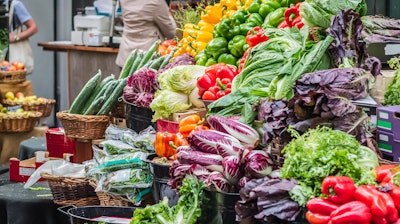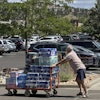
Local food suppliers saved the day during the COVID-19 pandemic food shortages, but new research from the University of Sheffield also finds lessons need to be learned if national food systems are to survive future crises.
Researchers worked with a variety of local U.K. food organizations, including food partnerships, charities, producers and sellers throughout the pandemic to see how COVID-19 was affecting their businesses, and address how local food networks can be advocated for in the U.K.’s food system to increase its resilience and sustainability.
In a series of new reports from the University of Sheffield’s Institute for Sustainable Food, the local food sector was found to have contributed to the resilience of U.K. food systems during the pandemic by providing access to food at a time when some were struggling to find the basics on supermarket shelves around the country, and highlighted the highs and lows of the pandemic experienced by those in the local food sector.
An ambitious vision the local food sector has for transforming the UK food system is also explored, and sets out how this sector can become an engine of societal, economic and ecological transformation in the U.K., while also indicating the systemic barriers and challenges facing organizations in achieving it.
The reports form a suite of evidence that can be used by policymakers to reconsider how "local" is considered in debates about how national food systems are organized, and improving outcomes for communities and their environments.
The pandemic was the first time many people experienced food shortages first-hand through the rows of empty shelves in supermarkets up and down the country after international borders closed around the world, preventing imports of food and other essential supplies and as supermarkets introduced demand management.
Local food producers and sellers sprang into action, organizing themselves and working together with local authorities to not only to help those vulnerable or in need, but to expand services and access to food due to people staying at home in lockdown.
Often seen as "middle class" or niche, local food organizations such as farm shops, food co-ops, farmers’ markets and shops, and local sellers offering deliveries of produce have not traditionally received funding as "core food activities" by policymakers, or been seen as "essential."
During the pandemic, many of these small, local enterprises turned out to be flexible and agile, offering new services and expanding their business capacity to meet the emergency response head on, and prove their value as essential services to their communities.
“For many during the pandemic, local food suppliers offered a much needed alternative solution to the difficulty of accessing food via supermarket chains during the height of the crisis," said Dr. Anna Krzywoszynska of the University of Sheffield’s Institute of Sustainable Food, the principal investigator on the project. “But now pressures from the pandemic are easing, many local food businesses have reflected on the last two years and are reporting difficulties, and a return to a marginalization of their enterprises.”
One farmer’s market commented, “I think that during this whole crisis people became really scared of supermarkets and going inside to shop and they realized that being outside was safer, but will they remember that in February 2022 when it’s freezing cold and it’s pouring with rain and it’s quite frankly warm in Sainsbury’s and you can park outside and it’s easy? They won’t remember that. And I think there should be loads more government campaigns supporting local food and local markets and there should be loads more support on the ground from local councils to make sure that we’re supported. But there won’t be, there never has been, there won’t be.”
Others commented that regular customers cancelled scheduled deliveries when they were no longer working from home, or could again find items available in supermarkets. Some also felt customers preferred not to pay the premium for local produce now they had cheaper alternatives back on the shelves.
The research suggests the toll the pandemic has taken on the local food sector is significant, and although none of the businesses involved in the project had shut down over the pandemic, more and more were starting to see colleagues or suppliers stop trading or leave the industry. Similarly, organizations who have supported people thrown into food poverty during the lockdowns were facing staff burn-out and having funding discontinued.
There are reasons to be positive about the future of local food systems though.
“It became apparent that during the pandemic, the values the local food sector is founded upon, trust, cooperation and fairness, became very relevant in a time of crisis, and enabled us not only to continue to function, but flourish and grow as a business, where other parts of the sector may have struggled," said Gareth Roberts of the Regather food cooperative in Sheffield. "Local food organizations aim to be of benefit for the people they serve and the environment and going forward, it needs to be recognized that there is an important role for local ownership and governance of local food supplies. This will improve the resilience of our overall food sector for the future, but also create better access to healthier, more nutritious and more environmentally friendly food.
“Despite these reasons to be positive about the local food sector, we’ve been under a lot of pressure to demonstrate our capability, but this needs support with access to land, opportunities for the development of skilled labour and investment to sustain in the long run.”
The researchers hope the reports will inspire policy makers and the public to think differently about how we get our food, and help reduce the barriers preventing local food businesses from thriving.
“Food may be cheaper in supermarkets, but this can come with higher costs in terms of the environmental or societal impacts. The local food sector often has better standards in production, trading and labour, so barriers to entry should be removed to allow new enterprises to grow, such as offering low interest loans for start-ups and better access to land for local food production," Krzywoszynska said. "Our research shows that a more diverse food system, which includes local food sector organizations, provides resilience which will help protect the nation during any similar future crises. The sector also takes little organization from central resources like local authorities as they are best placed to organize, adapt quickly, and address the needs of their own communities.
“The biggest message we can send with this research is that for resilience you need diversity, as a simple system will always be vulnerable to shocks like the pandemic. It is vital that these lessons are taken on board by policymakers, and they recognize the value in re-localization of our food sector by supporting local enterprises, to not only to survive as an emergency stop-gap when needed in times of crisis, but to thrive in the longer-term and improve how we access and enjoy food in the U.K.”






















